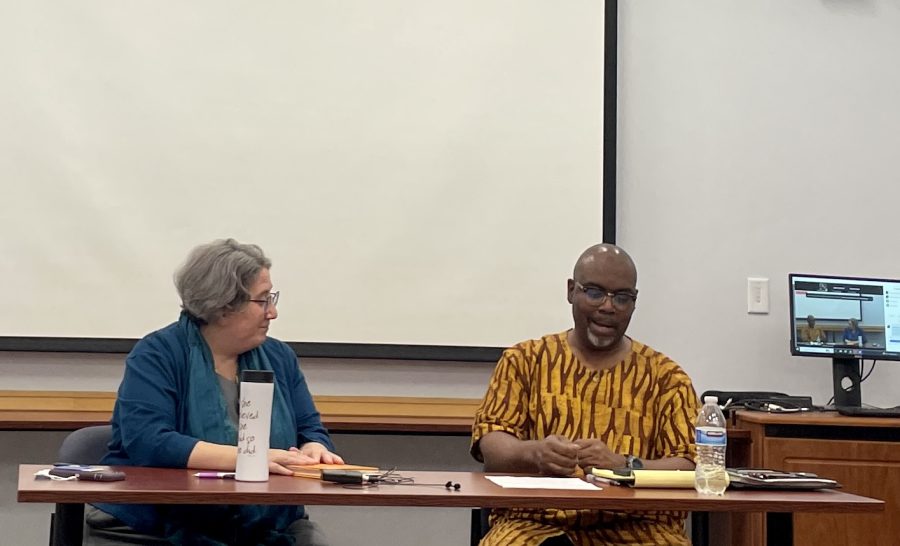SLU American Studies and Harris Stowe Panel Discusses Threats, Opportunities for Collaboration
This past February, at the start of Black history month, Harris-Stowe State University received a bomb threat. When Terri Foster, administrative assistant for the American Studies Department, heard about the threat, she said she gathered the department to brainstorm ways to support Harris-Stowe.
On Oct. 13, the department hosted an event with Gregory S. Carr, an assistant professor of Theater at Harris-Stowe, to discuss ongoing challenges facing Historically Black Colleges and Universities and opportunities for collaboration between the two institutions.
“There’s no reason why we are so close, and there’s no collaboration, I just don’t get it,” Foster said. “SLU struggles with reaching the African American community. All we have to do is open the door and allow them to come in and allow us to go there because we have to bridge that gap somehow. I’m hoping the talk we had was the beginning of that bridge being built.”
HBCUs receive bomb threats
According to the Department of Homeland Security, at least 49 HBCUs were targeted with bomb threats in the first few months of 2022, including Harris-Stowe. The Biden administration labeled the incidents “hate crimes” and in February, the FBI launched an investigation into the threats. Nine months later, there have been no arrests.
The American Studies Department had hoped to host the event about HBCUs soon after news broke about the threats in February to show immediate support because of a scheduling conflict.
“Unfortunately, it is still just as current and urgent a topic, not just with the specifics of ongoing bomb threats, the most recent which was about two months ago, but also in the broader context of other kinds of threats and obstacles to HBCUs,” said Heidi Ardizzone, American Studies associate professor who sat with Carr on the panel.
Carr recalls how he felt when he learned about the threats.
“It was hurtful. I had already been through this before but to see my students go through it, it did something to me,” Carr said.
In August, Harris-Stowe received another bomb threat, Carr said, reintroducing a sense of fear for students and staff.
“It’s not a new thing, it’s not an anomaly. We know historically that institutions of higher learning that are Black have been terrorized, there is no other word you can say,” Carr said. “They have been terrorized, they have been burned down, they have been threatened.”
History of Harris-Stowe
Before emancipation, there were locations for Black education that existed illegally and were often targets for violence, Ardizzone says. Post-Civil War, there was a national push for HBCUs, but Carr says Harris-Stowe’s history is “unique” as two previously segregated institutions, Harris Teachers College and Sumner Normal School, were joined together.
The earliest predecessor of Harris-Stowe, the St. Louis Normal School, was established in 1857 for white students in St. Louis, later renamed Harris Teachers College. A second predecessor institution was Sumner Normal School, which was formed in 1890 as a school to educate and train future Black teachers of elementary schools. In 1924, the Sumner Normal School became a four-year institution, and its name was later changed to Stowe Teachers College, in honor of the abolitionist Harriet Beecher Stowe.
“There’s this huge gap of 33 years of Black people not being able to get some formal training to teach children,” Carr said. “Then these two institutions go on this parallel path work for a while,”
These two higher learning schools were merged by the Board of Education of the St. Louis Public Schools in 1954 as an initial step to integrate the schools.
“There’s some bad blood because once the two came together, the president of Stowe Teachers College, Dr. Harris, was fired. They decided to erase Stowe from history,” Carr said.
Twenty-three years later, the alumni of Stowe Teachers College held a silent protest at the Board of Education demanding a change to the name. The Board approved the change.
“That’s where the hyphenation comes from, Harris-Stowe. I always tell people this [hyphenation] is a result of social activism,” Carr said.
Working at an HBCU, Carr says his role as an educator is deeply rooted in activism.
“I see us at the juncture in time, very much like W.E.B. Du Boise and Booker T. Washington at the beginning of the 20th century, seeing these individuals coming from the farms to HBCUs to learn,” Carr said. “Instead of them coming from the farms [today], they are coming from urban areas.”
Opportunities for collaboration
Across SLU, there have been various collaborations with Harris-Stowe through the Theater Department and articulation agreements via the Engineering Department. The two universities also have joint tuition exchange agreements which allow students to take courses at each other’s campuses.
In addition to being an instructor at Harris-Stowe, Carr is also a doctorate student in the SLU American Studies Department, linking the two together. While this individual connection has been fruitful, Ardizzone says a more “structural” relationship will strengthen their ties.
“I think that we could be better neighbors and raising consciousness on our campus is the first step in doing that,” said Emily Lutenski, American Studies associate professor and department chair. “There are communities on our campus that are already enmeshed with Harris Stowe. For example, Black fraternities and sororities that are city-wide already have these robust cross-campus networks. But for so many, especially non-Black students and faculty, we are not paying enough attention to what we could do to be good allies.”
Federal grants, Carr says, are an opportunity for large-scale cooperation between the two administrations because of continuous interest in funds.
“I hope that we can just cross Compton,” Foster said. “That’s all it takes, just cross Compton or meet in the middle if necessary, just to bring the two universities together.”
While a small department, Foster says American Studies is “mighty” as it brings important and often unheard conversations, such as this cross-campus event, to the SLU community.
“If we really want to be people for others, we have to start at home and our home is right here across the street. We have to start opening up and step out of [our] bubble…We’re safe and they’re not…We need to let them know that [they’re] not alone,” Foster said.
Your donation will support the student journalists of Saint Louis University.





